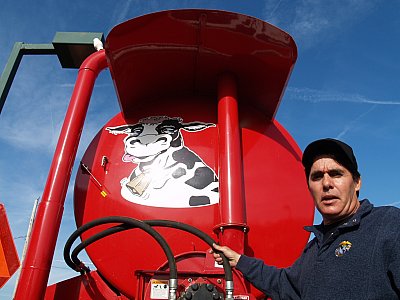CANAL FULTON, Ohio — When the economic crisis hit Jeff Chapanar and his excavation business, he and his wife, Marilyn, decided to hit back.
The Stark County couple didn’t fight the market, which for the past year has seen a substantial drop in new home construction and a reduced demand for excavation. Instead, they used the skills and technology they already knew and entered a new market — manure hauling.
Taking advice
A nearby dairy farmer who the Chapanars once dug a manure pit for, kept telling them they should get into the business of hauling and spreading livestock manure.
“Finally, we listened,” said Marilyn Chapanar, who helps her husband run the business.
The couple, along with trucker George Huth, decided to build two custom-designed trucks, each capable of hauling 4,600 gallons.
The project became a group effort of employees and of local volunteers and companies, including dairy supplier Hill’s Supply, Akron Hydraulics, Cross Truck, Akron Bearing and Graphic Accents.
Making investments
The Chapanars bought two Osh-Kosh six-wheel drive trucks and welded the massive steel tanks together in their shop. They added several custom features, like special coolers for the hydraulic fluid and a rear cover that helps prevent the manure from slinging onto the tank, or onto the roadway.
Combined, both trucks cost about $100,000 to build and would have cost tens of thousands more if the couple had bought them already finished.
Sensible decision?
But the big test for the Chapanars, and one they’re passing so far, is does it make sense to add another service like this?
So far, yes. Jeff Chapanar has already been contracted to spread about 1.4 million gallons of cattle manure, and 600,000 gallons of pig manure.
Has similarities
He said excavating and manure handling are kind of similar, because both require a lot of work that very few people ever see.
“Almost all of our work goes under ground,” he joked.
Marilyn Chapanar said she’s seen others in the building industry “go away” in the past year, and did not want it to happen to their business.
“We don’t want that to be us,” she said. “We want to be proactive and we want to do what we need to do to stay viable.”
STAY INFORMED. SIGN UP!
Up-to-date agriculture news in your inbox!










